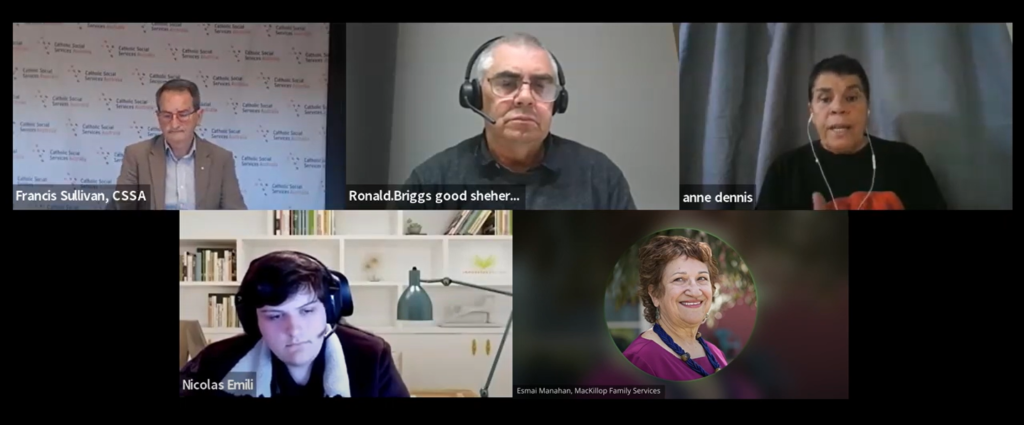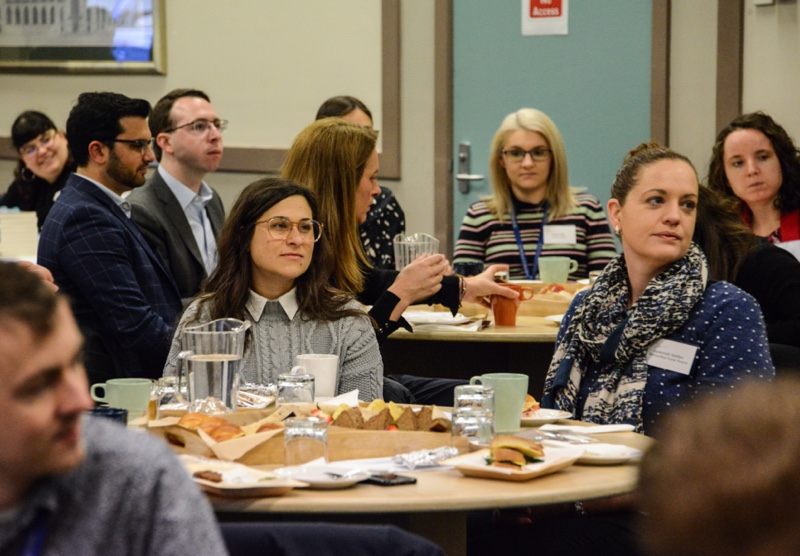The voices of three Aboriginal and Torres Strait elders were recently heard in an online panel discussion aimed to help foster discussion and deeper understanding about the upcoming referendum. Hosted by Catholic Social Services Victoria and Catholic Social Services Australia, the three-part series, Indigenous Voice to Parliament: Moments for healing this country, provided an opportunity for hundreds of participants to hear from a variety of speakers as they unpacked the implications for voting yes or no in the upcoming referendum.
In the final webinar, Indigenous elders, Uncle Ron Briggs (Yorta Yorta), Cr Anne Dennis (Gamilaraay) and Esmai Manahan (Yorta Yorta) reflected on their experiences over time, their hopes and concerns for the Voice referendum in 2023 and what they may be asking of the Church, Catholic organisations and the wider community.

Uncle Ron Briggs is Senior Aboriginal Cultural Advisor at Good Shepherd Australia New Zealand. He has worked for 25 years in men’s health and co-facilitated a drug and alcohol program withing the Victorian justice system. He has sat on boards of governance for the Victorian Aboriginal Health Service and numerous other committees focussing on health and wellbeing of the Melbourne Aboriginal community.
Speaking of the upcoming referendum, he says,‘It’s not only about reconciliation. It’s also about uniting Australia as one.’
‘Take the 1967 referendum back in the early days when that referendum came through and how Australians got behind that, all united as one for a fair vote for First Nations people across this country. That was a milestone,’ he says. ‘From an Indigenous point of view, that was a steppingstone for better life expectancy for our people. But that was just phase one, to be able to be recognised as a human being and not as fauna and to be able to vote. Those were important avenues for our people.
‘Since the 1967 referendum, we’ve come a long way in uniting our First Nations people across this land and the waters. They’ve brought their culture, their knowledge, and their experience to broaden and upskill our non-Aboriginal colleagues around the importance of culture when it comes to First Nations people.’
Uncle Ron expressed his ongoing concerns for First Nations people in light of the findings and ineffective outcomes of the Royal Commission into Aboriginal Deaths in Custody in the 1980s and the Closing the Gap report, and the high number of Indigenous children in out-of-home care. He believes these initiatives have been unsuccessful because ‘no-one has involved community members within the process of what’s best practice for our people’.
‘What is best practice for our people is the number one tool, which we all know is the cultural input—ensuring culture is embedded within any program you put together to strengthen the healing process for our people. And that can only be done by First Nations people.’
Linking this to the upcoming referendum, Uncle Ron acknowledges the many Indigenous and non-Indigenous people who have ‘come together to walk alongside’ each other, recognising how far they’ve come, and united in their endeavour to bring the voices of First Nations people to the table.
Voting yes is change for the good. We don’t want to separate the people. We are concerned about the health and wellbeing of our community, and we need to have the rights to be able to rule over our lives in the sense of speaking about our communities and our people.
Uncle Ron Briggs
Yorta Yorta elder, Esmai Manahan, is National Director of Aboriginal Services at MacKillop Family Services. She says she was ‘fortunate’ to be raised in a strong family that was well connected to culture and politically active in Aboriginal matters.
‘All my life I’ve been immersed in Aboriginal issues. My brothers and I were raised in an environment of strong cultural connection to the local and then very small Melbourne Fitzroy Aboriginal community … I was involved in the early NAIDOC Week activities and my earliest jobs were with the Aborigines Advancement League and the Victorian Aboriginal Child Care Agency. I’m blessed to have been involved in community all my life, and I’m grounded by the many experiences.’

Esmai can particularly recall her family’s involvement in the 1967 referendum, and their going out to gain signatures on petitions from ‘everyday Australians’ in support of the yes vote. ‘Thousands and thousands of Australians supported the need for a referendum and the vote, and well over 90 percent were in support, and of course it passed.’ Esmai also noted the bipartisan support of political parties for the 1967 referendum, which is lacking in the current discourse.
She says, ‘I stand firm as an Aboriginal woman, respectfully acknowledging the differences of opinion across the whole of Australia and our communities, but we need change. We need treaty. We as a people have waited long enough to be heard, to reclaim our rights to Aboriginal self-determination.’
I’m very passionate about the referendum and the yes vote because I believe it’s time for change and it builds on the work of our ancestors and our relatives who worked so hard for change.
Esmai Manahan
The third panellist to share her perspective, Cr Anne Dennis, is a Gamilaraay woman. She has worked as a teacher and administrator in education for more than 45 years. She was first elected to the New South Wales Aboriginal Land Council in 2011 and has a history of being committed to the role of independent, self-sufficient, local Aboriginal land councils, and in delivering better educational outcomes and social justice for Aboriginal people.

Anne was born on one of two Aboriginal Reserves in Walgett, in northwest New South Wales. It’s a small, rural community, with many families living in isolation. Her father was a shearer, and the community relied heavily on cotton chipping. ‘Our communities are changing,’ she says. ‘There’s not much seasonal work around now because it’s all either dry cotton or it’s controlled by chemicals and machinery.’
Having worked for over 45 years in government, administration, and systems, she says it’s been difficult to implement long-term, effective programs, policies and resources for isolated communities (in particular), as ‘the goal posts shift’ each time there’s a change of government. Often, decisions are made outside of the community, too.
‘When they talk of a whole-of-government approach to our community, they’ll actually meet in Sydney or they meet in Orange,’ she says. ‘We’re not even at the table when policies and programs are devised to be implemented into our communities.’
Through her experience, she says,
Government systems cannot make the change for us. It needs to be the people who actually direct government. So, the Voice to Parliament is about building the capacity, empowering local Aboriginal people, building those partnerships, and walking together to be able to do that.
Cr Anne Walker
Like Esmai and Ron, Anne acknowledged the many movements and actions of First Nations people who’ve gone before her, who laid the foundation for where we find ourselves today.
‘When you look historically, the Freedom Ride came through Walgett in 1965, then we had the national referendum in 1967, the Tent Embassy established in 1972, the walk for reconciliation across the Harbour Bridge in 2000. The support we’ve had makes me hopeful.
‘A Voice to parliament will give Aboriginal communities a way to help inform policy and legal decisions that impact their lives directly.’
In closing the webinar, Chair of CSSA’s Board, Francis O’Sullivan, encouraged participants to act in fostering conversations and deepening understanding among family, friends and colleagues. ‘Sometimes people think “others” are better placed to have the conversation, but when it comes to referendum day, there are no others than ourselves,’ he says.
‘This is a moment where our own personal agency is the key. Yes, there’s going to be a lot of information. There’ll be a lot of noise. There’ll be a lot of impassioned arguments, but that doesn’t take away from any of us, the fact that it’s our personal agency that needs to be engaged.
‘The thing I found most helpful, to be honest, is to try and get a sense of how the voice as a concept has grown through our history to a point where, for me personally, it’s quite compelling. Earlier times in our history, other vehicles have been suggested, but frankly, this is our moment. We’re being asked to do something that’s responsive to the now.’
For more information, the National Aboriginal Torres Strait Islander Catholic Commission, together with the Australian Catholic Bishops Conference, has developed the website www.indigenousvoice.church which brings a whole range of Catholic voices and other resources in one place, to help with discernment.


Join our mailing list
Keep up to date with latest news, information and upcoming events.
We respect your privacy, as outlined in our privacy policy.